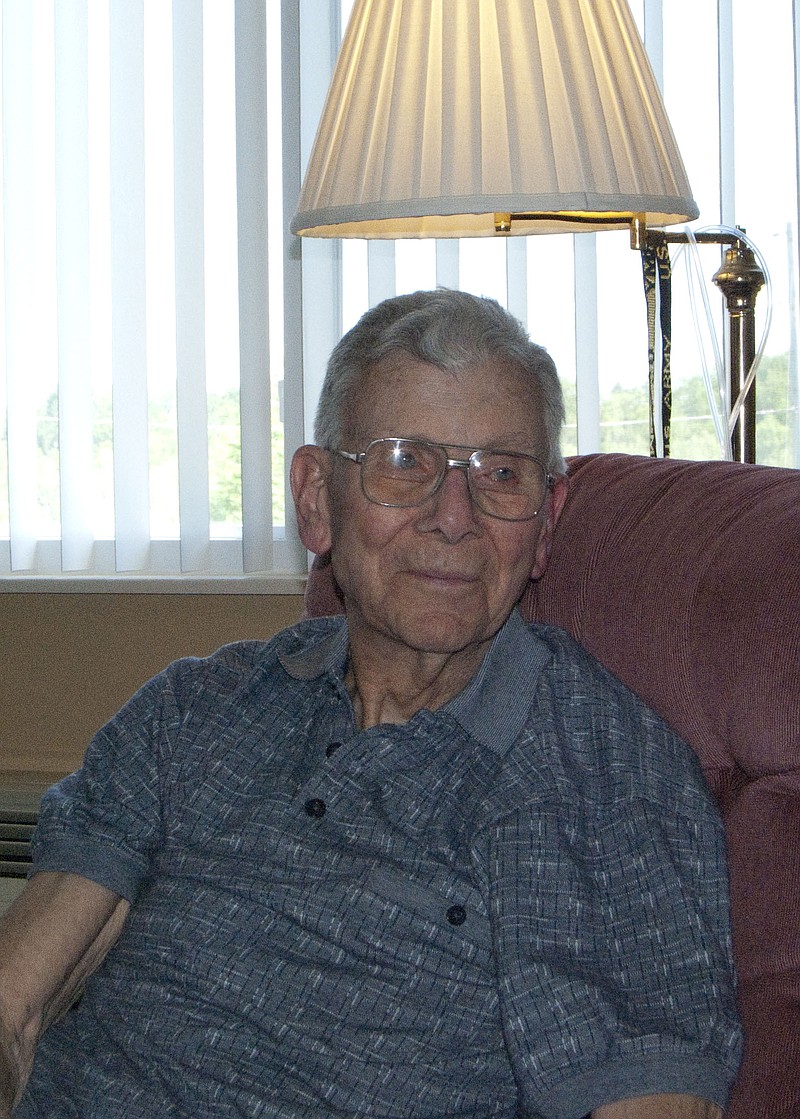At 90 years of age, local resident Ray Herigon has accrued a lifetime of experiences to share with the younger generation. But the memories he made during two years he spent in Europe in the Second World War appear the most poignant and colorful in his vast collection.
Born and raised in the St. Thomas area, Herigon graduated from Meta High School in 1941.
He then commuted to Jefferson City for several months to attend a machinist school, which, as he noted, was sponsored by the United States government.
With good jobs in short supply, Herigon traveled to St. Louis and was able to secure a one-year deferment from the draft by working at a defense manufacturing plant.
"We were making 20 and 40mm aircraft projectiles," Herigon recalled.
While working at the plant, Herigon was married, but his honeymoon period was soon interrupted when he received notice to report to Ft. Riley, Kan., for induction into the Army after his deferment expired in 1943.
"I knew it was coming," he smiled.
He was sent to Ft. Hood, Texas, to complete boot camp and learn to be a gunner on light-armored vehicles.
This was followed by a few weeks of infantry training at Ft. Meade, Md., an experience which Herigon asserts was "practically another basic training" consisting of calisthenics and marksmanship practice at firing ranges.
The young trainee then reported to Camp Shanks, N.Y., and received instruction on the proper procedures for boarding amphibious vessels. Completing all of his preparatory training in late spring of 1944, he boarded a ship bound for overseas service.
After spending a short time in Wales doing what Herigon describes as "training to keep the soldiers busy," he was transferred to a location near Liverpool, England, as part of a replacement company.
"We were told we would be replacing GIs lost in the beach landings (on D-Day)," he said.
Arriving on the beaches of Normandy, France, by amphibious boat on June 9, 1944, three days following the initial Allied invasion, Herigon was assigned to the 42nd Field Artillery, HQ Battery.
Herigon notes he was in combat the next several months as the battery-attached to the 4th Infantry Division and commanded by Missouri native Gen. Omar Bradley-fought its way through locations in France, Germany, Holland and Luxembourg.
Serving in communications and as a forward observer, Herigon participated in the Battle of the Bulge in January 1945 - a major offensive that took place toward the end of World War II.
"They had everyone on the line during the Bulge," Herigon said. "Cooks ... even medics had rifles. But we stopped the Germans," he boldly added.
Toward the latter part of the war, Herigon spent a brief period with American occupational forces in Germany awaiting orders to return to the states, which he received in July 1945.
He returned home for a brief period of leave before reporting to Camp Butner, N.C., where he served as a messenger until his discharge from the Army a few months later.
After moving to St. Louis for a short time to work for General Motors, Herigon eventually returned to the Mid-Missouri area and worked for several local companies before retiring in 1984.
A recipient of a Bronze Star Medal for valor, Herigon has been a member of the American Legion and Veterans of Foreign Wars for more than 50 years and in 2009 participated in the Central Missouri Honor Flight to see the World War II Memorial in Washington, D.C.
"The (Honor Flight) was a wonderful experience - I would go back on it in a minute," he excitedly stated. "The memorial, the camaraderie ... everyone just bent over backwards to make us feel special."
The father of 11 children - three of whom have also served in the military - Herigon explains that the most profound lessons encountered during his time in service were those of independence and being able to rely on others.
"The military teaches you many things, including how to make it on your own," he said. "And when you are under the stresses of combat, you also learn the importance of counting on your fellow soldiers ... the importance of helping one another."
Jeremy Amick is the public affairs officer for the Silver Star Families of America.

